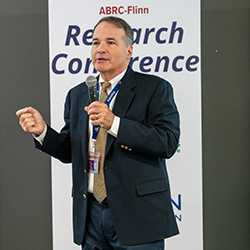
10th Annual ABRC-Flinn Research Conference Serves as a Forum for Research Discovery and Innovation

Featuring 13 oral presentations and 87 research posters, the 10th Annual Arizona Biomedical Research Centre (ABRC)-Flinn Research Conference was an engaging environment for researchers to share their ongoing work and discoveries. It was also a powerful platform for the value of collaboration.

In his opening remarks, Dean Fred Wondisford, MD, MS, MBA, noted the importance of partnership in fostering research discovery. “It is nice to know that we have entities that are interested in working with us to promote research,” he said. “We wouldn’t be able to do the research we’re doing without [ABRC and the Flinn Foundation’s] help…So it is with pleasure that I have the honor of introducing this conference because we value partnership.”
Keynote speakers for the event were Melissa Herbst-Kralovetz, PhD, professor of Basic Medical Sciences, as well as Obstetrics and Gynecology and director of the Women’s Health Research Program, and Alexander B. Niculescu, MD, PhD, a professor of Psychiatry at the college and the founding director of the Center for Precise, Personalized and Preventive Psychiatry.
Their respective talks focused on how women’s health is being transformed through new non-invasive diagnostics for endometrial cancer detection and prognosis, and on how the mental health care of the future is being built.
Endometrial Cancer Detection and Prognosis
Endometrial cancer is the most common form of gynecologic cancer and the fourth most common cancer in women worldwide, according to the American Cancer Society. With those rates — as well as the mortality rate for those diagnosed with it — continuing to rise, the need for improved testing has never been more urgent.

Currently, there are several issues related to its testing and diagnosis. Testing is invasive and painful, and it requires an on-site clinical visit where a physician collects the specimen. This type of testing is far less accessible for those living in more remote or rural areas.
To help address this, Dr. Herbst-Kralovetz, along with her team of researchers, has been working to develop non-invasive testing to allow for easier access and earlier diagnosis — both of which are vital to ensuring better outcomes.
“We want to develop tests that could monitor uterine health overall; something that could be implemented in the course of a wellbeing exam on an annual basis; and have accessibility to all ages and stages of women, be culturally acceptable to all women and be broadly available,” Dr. Herbst-Kralovetz explained.
They collected samples from more than 190 women with endometrial cancer and non-malignant conditions, utilizing gentle cervicovaginal lavages. Through those samples, they performed global untargeted metabolomics. That data then fed into an analysis of biomarkers for endometrial cancer.
“You can see that we have all these omics that we’re building. We can start to integrate these omics to see what the most sensitive and predictive biomarkers are, and move those forward as possible diagnostics,” Dr. Herbst-Kralovetz said.
As they continue to collect this data, their goal is to translate it, determine what biomarkers are most clinically effective and then utilize those for improved diagnosis for safer, less-invasive testing.
Precise, Personalized and Preventive Mental Health Care
The research of Dr. Niculescu is also utilizing comprehensive genetic data to better identify those at risk for psychiatric disorders. “Really, you’re dealing with three big domains — the anxiety domain, the mood disorder domain, cognitive domain — and stress is a major trigger of all of them,” Dr. Niculescu explained.
For many years, psychiatry lagged other medical specialties when it came to understanding diseases within the field, the diagnostics behind them and how to treat them.
Using Convergent Functional Genomics, phenomics and the identification of blood biomarkers, Dr. Niculescu and his fellow researchers have bridged that gap.

The general idea behind their work is to identify what factors contribute to diseases within those domains — such as bipolar disorder, schizophrenia and anxiety — as well as where those factors intersect.
Because, ultimately, the most effective way to treat any of these is through a personalized approach. And that requires thorough research and data collection.
“We took a very careful four-step approach to discovering, prioritizing, validating and then testing for clinical validity of potential blood biomarkers. And we think this sort of very meticulous approach is necessary, so we don't delude ourselves or others, especially our patients, by announcing findings prematurely based on one study or one cohort,” he said.
He added, “If you discover something in the lab, that's great; but you have to work sometimes much harder to push it into practice.”
In addition to the keynotes, the more than 190 in-person attendees heard presentations from grant awardees representing the ABRC, Flinn Foundation, and the UA College of Medicine – Phoenix Catalyst Funding. The research posters featured on campus are available to view online.
About the College
Founded in 2007, the University of Arizona College of Medicine – Phoenix inspires and trains exemplary physicians, scientists and leaders to advance its core missions in education, research, clinical care and service to communities across Arizona. The college’s strength lies in our collaborations and partnerships with clinical affiliates, community organizations and industry sponsors. With our primary affiliate, Banner Health, we are recognized as the premier academic medical center in Phoenix. As an anchor institution of the Phoenix Bioscience Core, the college is home to signature research programs in neurosciences, cardiopulmonary diseases, immunology, informatics and metabolism. These focus areas uniquely position us to drive biomedical research and bolster economic development in the region.
As an urban institution with strong roots in rural and tribal health, the college has graduated more than 1,000 physicians and matriculates 130 students each year. Greater than 60% of matriculating students are from Arizona and many continue training at our GME sponsored residency programs, ultimately pursuing local academic and community-based opportunities. While our traditional four-year program continues to thrive, we will launch our recently approved accelerated three-year medical student curriculum with exclusive focus on primary care. This program is designed to further enhance workforce retention needs across Arizona.
The college has embarked on our strategic plan for 2025 to 2030. Learn more.